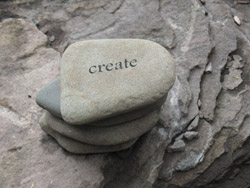20 Tips for Writing Children’s Books

I teach a workshop, “Zing! Seven Creativity Practices for Educators and Students” (for more information on my presentations, click here) and am often asked for advice about both the writing and about being published. As I say in the tips below, there’s a difference between advice to a new (regardless of age) writer and advice to someone who wants to be published.
Advice to the writer: Be curious. Read what excites you. Prepare for the journey; it’s joyous but not easy. Pack snacks. Learn to savor revision.
Advice to the writer longing to be published: Ponder how you handle rejection. It’s not that much fun. Assess your level of stubbornness. It’s a challenge: keeping the heart soft and the skin thick.
How exciting that you want to write children’s books! I became interested when my three children were little, and I’ve loved the genre ever since. Fair warning: writing children’s books is like tasting candy. Once you start, it’s difficult to stop. I wrote about how irresistible writing picture books is in my book, Zing! Seven Creativity Practices for Educators and Students.
Because of the emphasis on publishing, we sometimes forget that writing and publishing are different activities. Publication doesn’t have to be the goal of all writing. We can write (and illustrate) children’s books for our families, neighbors, students, friends; and such writing is also valid and important. Here are a few hints for both writing and publishing book for young readers.
- Remember your child-self, your feelings, childhood memories, worries and pleasures. (Most picture books are for 3-10 year olds.)
- Create your writing time and mull–about what to write, about how to write it, about how to be daring. Among your key resources are your love of stories and language, your spirit, imagination and persistence.
- Be welcoming of your writing. Welcome your ideas as you would welcome a guest. Resist thinking negatively about your work.
- Read picture books both old and new.
- Visit bookstores and libraries. Become acquainted with the person in charge of children’s books who may know about workshops, writing groups, school visit opportunities.
- Create systems for jotting ideas and images.
- Consider taking writing workshops, attending conferences, joining the Society of Children’s Book Writers and Illustrators (SCBWI).

- Many books are available about writing children’s books. Read at least one and read books on creativity.
- Start or join a writing group.
- Cultivate the habit of revision. The many books about writing help this essential habit.
- Know your goal. If publication is important to you, learn about the field. Some writers find it helpful to know what’s being published. They read reviews of picture books and browse in bookstores.
- Understand that picture book publishing is a collaborative process. The collaborators are the author, the illustrator, the editor, the art director, and sometimes the editor-in-chief and marketing staff. If you need total control of the of the process, best publish your own manuscript.
- Know that publishing is a business. Wonderful books get published; wonderful manuscripts don’t. A publisher has to believe that a manuscript will sell when it competes with 5,000 other books.
- Be prepared for rejection. Editors receive thousands of unsolicited manuscripts. Have I ever gotten used to the rejection? NO.
- Know the advantages and disadvantages of small and large presses.
- Submit your best work intelligently. Know the submission process.
- Be persistent. It is not easy to have a manuscript accepted.
- Never underestimate the importance of supportive friends and family.
- Share your work. This will give you and others pleasure and will encourage you to write more.
- Love your work. Care about the process of writing and the honor of writing for children. Be committed to that. Having a book published probably won’t change your life, but being committed to writing and children can change your life and the life of your readers.
May you write work you love.
Good luck!
¡Buena suerte!
Buona fortuna!
Pat